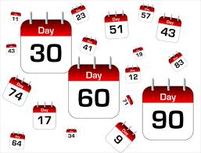
I'd like to update you on my progress but I'm pretty sure you aren't interested that I got my grading done, did some house cleaning, and made some headway on organizing my office. I will admit, the Christmas decorations are still up, but the tree is down. I love decorating the tree, and even taking it down, because it allows me to be nostalgic, recalling the meaning of each ornament and the lifetime of memories that they represent. There is a story with each ornament drawing us closer to someone we love, a special event, places we've visited, or something we collect, all serving as reminder of days gone by. All the ornaments are beautiful or precious in their own way, but there are no longer any ornaments on our tree whose sole purpose is simply for decoration. Our life is full and so is our tree; reflecting great love and fond memories.
This walk down memory lane leads me to my real focus on "What's next?" Nostalgia has its place, and represents a valuable part of us, but we can't live in the past. As we turn the calendar, it reminds us that life is to be lived forward. If you put forth a few resolutions to begin the New Year, you have probably already stumbled on that path to improvement by now. It's OK. It's part of the process. Get back up, reflect, revise, and start moving forward again. Failure can be some of our best lessons during the learning process... as long as we don't let failure stop us in our tracks. I sound like a teacher or a coach, right?
We often plan for our future....the development and desire to achieve goals keep us focused and moving forward in the "right" direction. Aimless wandering may be fun for a brief vacation, but it's not an effective life path. Attaining long term goals requires a short term plan too. What can we do now? I really like the concept of a 30-60-90 day plan. Even if my goal is a year away or longer, there are steps that I can take right now to ensure I'm on the right path! In education this might look like checking for understanding or formative assessments. As a traveler we might call these check points. Regardless, they let us know how we're doing and if we need corrective action or just to proceed full speed ahead. What can I do in the next few weeks to get started? What will come next? No matter what it is you hope to accomplish, this kind of steady, deliberate focus will result in progress toward the end goal. If you want to lose 50 pounds, can you do 10 in 30 days and how will you accomplish this? in 60 days? in 90? If you want a better financial situation, what can you pay off or save in 30 days? 60 days? 90 days? If you want to clean up your house or yard, what can I do to break up these tasks into manageable chunks and make them doable? The length of the time between these check points isn't the key to success...making the task/goal manageable and holding yourself accountable is.
But we all know that sometimes it's just not that easy. Sometimes life throws you curves you weren't expecting or detours that force you to change your strategy, timeline, or even your goal. Now what? Try as we might, we can't control everything that happens to us. We can research options and make the best decisions possible at the moment. We can anticipate obstacles and plan for their occurrence. We can exercise and eat healthy food to reduce our risk of illness or injury. But life sometimes throws us a curve ball we weren't expecting in spite of our best efforts. Maybe an accident or illness puts the brakes on our best laid plans. What if we lose our job or get our hours cut? What if a trusted relationship ends? Even as I write this the timing couldn't be more perfect since my husband just walked into my office and told me the transmission in his Jeep is bad and must be replaced. (sigh) How we respond to that curve ball will determine whether we take a hit, or get a hit.
If we use the same strategy to attack this new challenge that we just outlined to achieve our goals, we can turn these obstacles into something that we can overcome. We may have to spend the first 30 days grieving or gathering information. And we must view that as time well spent - progress if you will - and a necessary part of the process. Then we can determine what we will do in the next 30 days, 60 days, and so on. It may push our ultimate goal further out, or change it completely, but if we tackle those obstacles with the same strategic thinking that we originally planned, then we can determine a new path.
So take a moment to look in the rear view mirror and see where you've been, but then get your attention focused on what's in front of you. The windshield is a lot bigger than the rear view mirror for good reason. Where will you be in 30 days? 60 days? or 90 days? How far will you have gone toward reaching that new goal or overcoming the latest challenge? See you down the road! I can't wait to see what's next!


 RSS Feed
RSS Feed